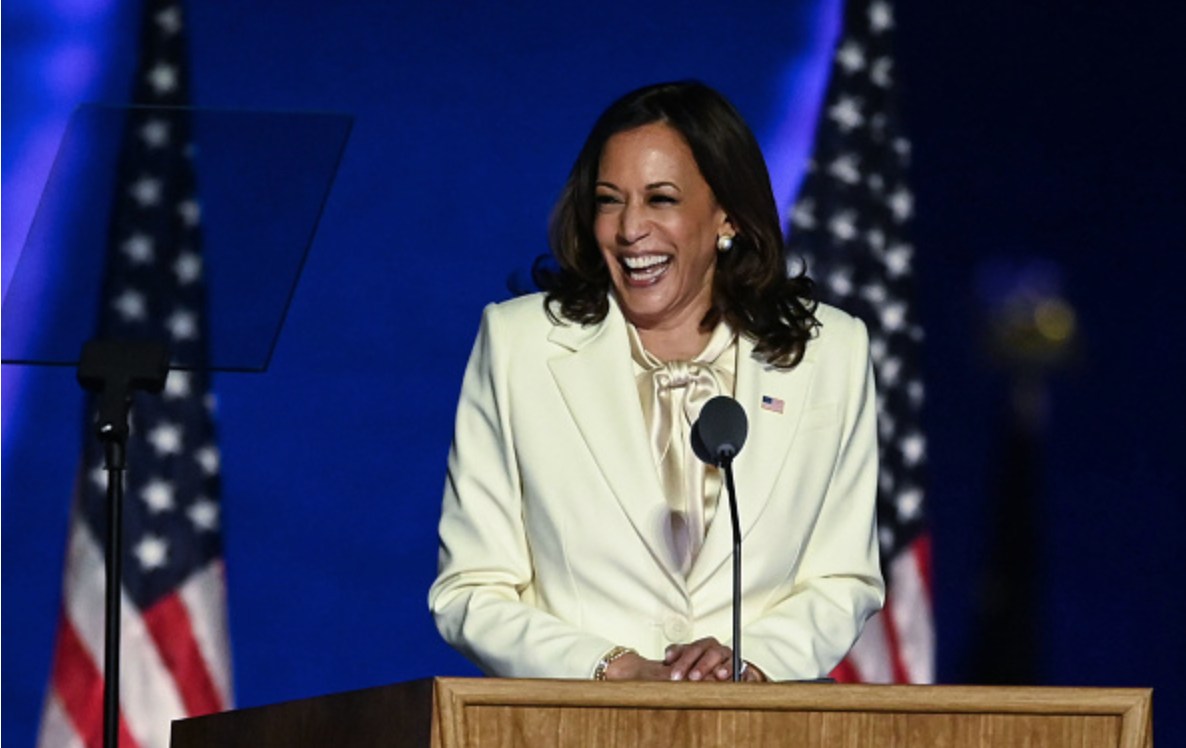
PERFORMANCE ART takes many forms. On Sunday, it was realized in the impassioned sermon preached by Rev. William J. Barber II from the pulpit of his Greenleaf Christian Church in Goldsboro, N.C. Invoking history, astronomy, and the lyrics of Mary J. Blige, he said Vice President-Elect Kamala Harris is the light of the world, emerging four years after the results of the 2016 election shifted the norms of American democracy and generations after historic African American women made her ascension possible.
“The light from the nearest star takes more than four years to reach us. So when you go out into the bosom of the night and God shows you a star to prove to you darkness doesn’t have the final say, the light you see from the closest star is four years old. The light we see from the stars today has traveled millions of miles to reach us. Yesterday, we saw a star in Kamala Harris,” Barber said.
The night before, Harris stood outside on the stage at Chase Center on the Riverfront in Wilmington, Del., as Vice President-Elect of the United States. She introduced President-Elect Joe Biden, who gave a victory speech, his first remarks after clenching the Presidency.
Serving with Biden in the White House, Harris will be the first woman vice president in the history of the United States, the first Black vice president, and first South Asian to hold the office. Her history-making rise is the latest first in a career marked by trailblazing accomplishments. In 2003, Harris was the first Black woman elected district attorney of San Francisco. Then she became the first Black woman elected attorney general of California (2010). Elected to the U.S. Senate in 2016, she is only the second Black woman ever to serve in the Congressional body.
The light Barber speaks of was cast a long time ago and started shining in 1619, he said. “The light you saw on that stage yesterday, that’s Harriet Tubman,” Barber said. That was Sojourner Truth, Ida B. Wells, and Black women sororities who were organized for Black lives and to address voter suppression. That light had to travel through the generations, he said.
“That’s Fannie Lou Hamer saying, ‘This little light of mine, I’m going to let it shine.’ If they hadn’t shown their light, then we wouldn’t see what we’re seeing now,” Barber said. He continued: “That light had to travel through generations to reach a new generation and then the light from hundreds of years ago showed up onstage last night. Look at God. God can start a light way back yonder.”
“Yesterday, we saw a star in Kamala Harris… The light you saw on that stage yesterday, that’s Harriet Tubman,” Rev. William J. Barber II said. That was Sojourner Truth, Fannie Lou Hamer, Ida B. Wells, and Black women sororities who were organized for Black lives and to address voter suppression. That light had to travel through the generations.
Barber’s remarks are captured in a video produced by Repairers of the Breach, a nonpartisan, nonprofit founded by Barber in 2016 that “seeks to build a moral agenda rooted in a framework that uplifts our deepest moral and constitutional values to redeem the heart and soul of our country.”
A paster and social justice advocate, Barber is a 2018 MacArthur Fellow. For a dozen years, he served as president of the North Carolina conference of the NAACP (2005–2017). He has also been central to reviving Martin Luther King Jr.’s Poor People’s Campaign for a new time and generation.
From the pulpit, Barber spoke at the intersection of poetry and scripture. Then he declared the soulful lyrics of Blige preaching words. When Harris took the stage in Wilmington, she came out to “Work That,” Blige’s 2007 song from her album Growing Pains. “I know preachin,’ when I hear preachin’,” Barber said, citing Blige’s lyrics:
“This is more than a victory for Biden and Harris. This is a victory for democracy.…, Barber said in a statement about the election results. “An unprecedented coalition of American people have said clearly, ‘We cannot go backwards. We are going forward together.’” CT